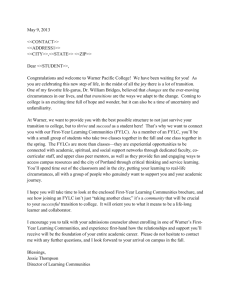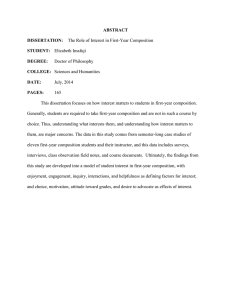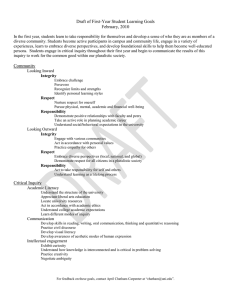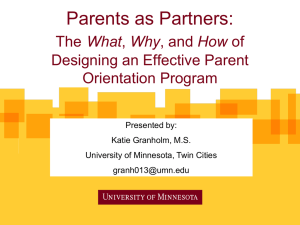1 FIRST-YEAR PHILOSOPHY STATEMENT
advertisement
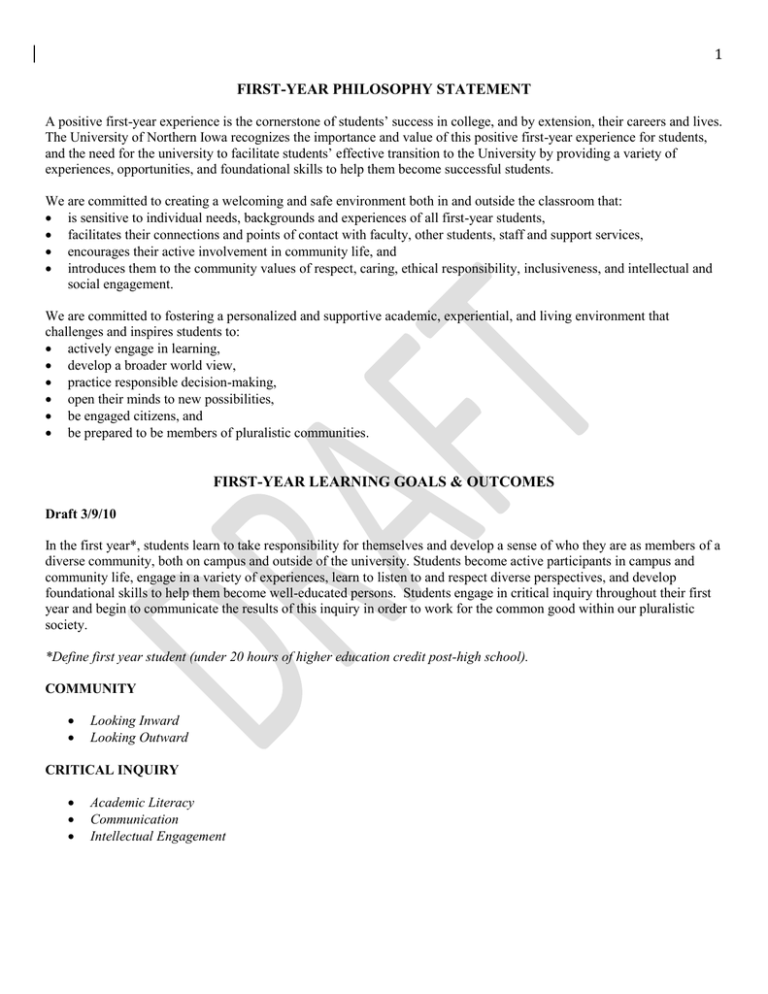
1 FIRST-YEAR PHILOSOPHY STATEMENT A positive first-year experience is the cornerstone of students’ success in college, and by extension, their careers and lives. The University of Northern Iowa recognizes the importance and value of this positive first-year experience for students, and the need for the university to facilitate students’ effective transition to the University by providing a variety of experiences, opportunities, and foundational skills to help them become successful students. We are committed to creating a welcoming and safe environment both in and outside the classroom that: is sensitive to individual needs, backgrounds and experiences of all first-year students, facilitates their connections and points of contact with faculty, other students, staff and support services, encourages their active involvement in community life, and introduces them to the community values of respect, caring, ethical responsibility, inclusiveness, and intellectual and social engagement. We are committed to fostering a personalized and supportive academic, experiential, and living environment that challenges and inspires students to: actively engage in learning, develop a broader world view, practice responsible decision-making, open their minds to new possibilities, be engaged citizens, and be prepared to be members of pluralistic communities. FIRST-YEAR LEARNING GOALS & OUTCOMES Draft 3/9/10 In the first year*, students learn to take responsibility for themselves and develop a sense of who they are as members of a diverse community, both on campus and outside of the university. Students become active participants in campus and community life, engage in a variety of experiences, learn to listen to and respect diverse perspectives, and develop foundational skills to help them become well-educated persons. Students engage in critical inquiry throughout their first year and begin to communicate the results of this inquiry in order to work for the common good within our pluralistic society. *Define first year student (under 20 hours of higher education credit post-high school). COMMUNITY Looking Inward Looking Outward CRITICAL INQUIRY Academic Literacy Communication Intellectual Engagement 2 COMMUNITY Looking Inward Learning Goals Integrity Students demonstrate integrity through examination of their own values, recognition of their personal strengths and limits, and perseverance in the face of challenges. Respect Students demonstrate respect for self through pursuit of physical, psychological, emotional, academic and financial wellbeing. Responsibility Students demonstrate responsibility through development of positive relationships with faculty and peers, active involvement in planning their academic careers, and understanding of the social and behavioral expectations of the university. Learning Outcome Statements By the end of the first year, students will: 1. Articulate and examine their personal values. Specifically, students will: Understand how their background influences their belief system. Recognize how worldview shapes decision-making and problem-solving. See connections between personal values and choices of action. Develop an awareness of and a sense of responsibility for their own behavior and how it impacts others. 2. Pursue physical, psychological, emotional, academic and financial well-being. Specifically, students will: Expand their strategies that directly relate to academic and personal success (e.g., time management, test taking skills, studying skills, stress management, financial management). Expand their strategies to assist them in making mature and responsible choices when faced with issues such as substance and alcohol abuse, personal health and safety, and sexuality. Expand their personal strategies and support systems for dealing with the transition to college. Become aware of health- and safety-related campus and community resources. 3. Take an active role in planning their academic career. Specifically, students will: Identify their strengths, limits, and personal learning styles and their effects on personal, academic, and career choices. Meet with their academic advisor to discuss topics such as academic progress, challenges, and future plans. Demonstrate the ability to use of the plan of study and their degree audit to determine the course of their studies. Engage in self-assessment to explore and expand their interests. 3 Looking Outward Learning Goals Integrity Students engage with various communities. Respect Students explore diverse perspectives (local, national, and global), demonstrate respect for all citizens in a pluralistic society, and practice empathy for others. Responsibility Students act to take responsibility for themselves and for others. Learning Outcome Statements By the end of the first year, students will: 1. Take part in opportunities to engage with diverse communities. Specifically, students will: Participate in co-curricular activities. Attend cultural events and programs on campus and in the community. Seek out connections with people with different backgrounds and perspectives. Explore opportunities for international experience. 2. Describe and practice principles of civility in and outside the classroom. Specifically, students will: Expand appreciation for and understanding of others from diverse backgrounds, cultures and viewpoints. Explore and show respect for multiple perspectives on controversial issues. Practice empathy for others. 3. Engage in responsible citizenship. Specifically, students will: Educate themselves about contemporary social justice issues. Find opportunities to serve individuals and groups within and beyond their communities. Stand up for the rights of others. 4 CRITICAL INQUIRY Academic Literacy Learning Goals Students will understand university policies, procedures and academic expectations, including those related to academic ethics, and be able to locate resources offered by the university community. They will understand the purposes and outcomes of a liberal education and develop skills in recognizing and using different strategies for learning and gathering information. Learning Outcome Statements By the end of the first year, students will: 1. Know where to locate and how to use university resources. Specifically, students will: Be familiar with the university catalog, student handbook, and academic policies and procedures. Know how to use the electronic course schedule and university catalog to explore course options and majors/minors/certificates. Be familiar with the university catalog, student handbook, and academic policies and procedures. Know how to access and use the kinds of information available on MyUniverse, departmental/instructor websites, and e-learning sites. 2. Take responsibility for their own learning. Specifically, students will: Identify appropriate campus resources and opportunities that contribute to their educational experience, goals, and campus engagement. Make use of resources that will help them do well in their coursework. Understand how to construct an academic plan of study. Reflect on the transition from high school to college, and identify their personal strategies for making a successful academic transition. 3. Develop skills for locating, evaluating and using information sources. Specifically, students will: Know how to locate and use library resources and assistance from library staff, both in the library and online. Know how to evaluate information sources. Learn about plagiarism and how to use and provide appropriate citations for information resources. Make effective use of technology in their academic studies. 4. Articulate the importance of a liberal arts education. Specifically, students will: See the relationship between a liberal arts education and major/career goals. Begin to see connections among various fields of study. 5 Recognize connections between coursework and their lives outside of the classroom. Gain exposure to a variety of intellectual, scientific, and artistic work. 6 Communication Learning Goals Students will develop skills in reading, writing, oral communication, thinking, quantitative reasoning and visual literacy, as well as an and awareness of aesthetic modes of human expression. Learning Outcome Statements By the end of the first year, students will: 1. Use written, oral, numerical, and visual communication to develop and articulate a variety of ideas and viewpoints. Specifically, students will: Improve their ability to produce written texts that are focused, clear, complete, effective, and grammatically correct. Increase their knowledge and skills in employing verbal and nonverbal communication messages in a variety of settings (i.e., intrapersonal, interpersonal, group, and public contexts). Improve their skills in understanding and using visual modes of communication. Enhance their ability to use quantitative data effectively and to apply relevant mathematical and statistical concepts and methods to diverse problems and situations. 2. Be able to appreciate, interpret, analyze, and evaluate the messages they receive. Specifically, students will: Explore diverse forms of human expression, including story and poetry, visual art, music, theater, and dance. Increase their awareness of the impact of visual modes of communication. Improve their skills in reading, listening, and critical thinking, with an awareness of the role different purposes and contexts play in interpreting and evaluating messages. 7 Intellectual Engagement Learning Goals Students will exhibit curiosity, practice creativity, develop skills in negotiating ambiguity, understand the interconnectedness of fields of knowledge and its critical role in problem solving, and take steps toward becoming lifelong learners. Learning Outcome Statements By the end of the first year, students will: 1. Demonstrate an ability to see relationships among academic disciplines and the importance of interdisciplinary learning. Specifically, students will: Appreciate that there are different ways of understanding. Develop knowledge of the complex interplay of culture, history, and human experience. Recognize connections between and across academic disciplines. Develop the habit of documenting the growth in skills and knowledge that results from experiences inside and outside of the classroom. 2. Seek out opportunities to add to their knowledge and understanding and become lifelong learners. Specifically, students will: Engage in intellectually challenging discussions, using critical thinking and collaborative dialogue. Understand the importance of asking questions to increase knowledge and extend understanding. Develop strategies for creative problem solving. Negotiate the complexities and uncertainties that arise when ideas, values, and worldviews conflict.
